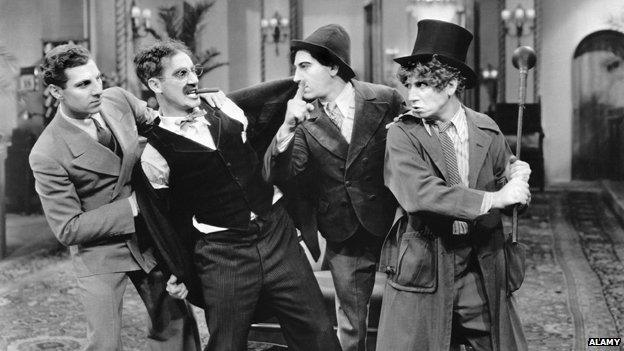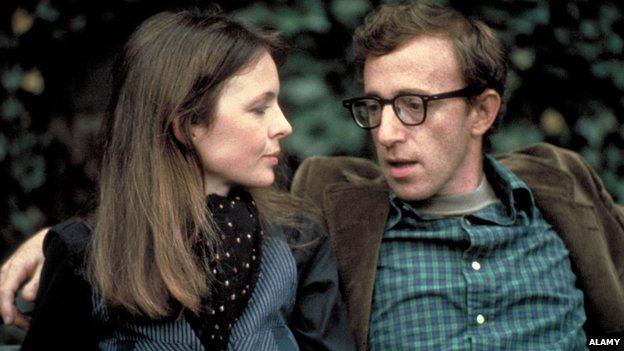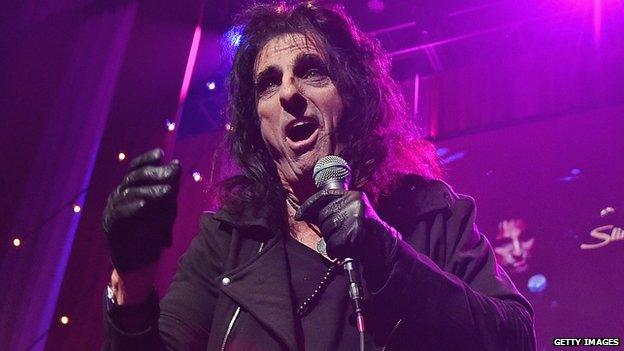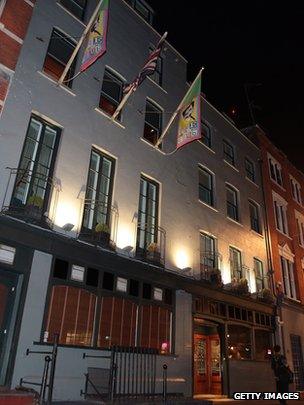How the Marx Brothers hold their appeal and influence
- Published

The Marx Brothers' Duck Soup has been pastiched by Mickey Mouse, Lucille Ball and in Seth Macfarlane's Family Guy
A movie ridiculing a country's leader hell-bent on conflict which incenses the international community is released in London cinemas this month.
Sound familiar?
The country is the fictitious Freedonia, the dictator is Rufus T Firefly as played by Groucho Marx and the movie is not the now infamous Interview, with James Franco and Seth Rogen and which opens next month, but Duck Soup.
It is one of eight films starring the legendary Marx Brothers (Groucho, Chico, Harpo and Zeppo) celebrated in January in a retrospective at London's BFI.
The 1933 movie was controversial for its time. Benito Mussolini banned it from Italian screens, which delighted the brothers.
It opened 10 months after Adolf Hitler was appointed chancellor of Germany, a country where all Marx Brothers films were banned even though their mother was born in Dornum.
When the city of Fredonia, New York complained about the similarly named Freedonia, Groucho wrote back to the mayor: "Our advice is that you change the name of your town. It is hurting our picture."
Although their last film, Love Happy (featuring an early performance from Marilyn Monroe) was in 1949, and Groucho died three days after Elvis Presley, the brothers' influence remains surprisingly durable in contemporary culture.
Groucho's former co-manager Shep Gordon has no doubt why. "Their movies will always be relevant because it is intelligent, character-driven humour," he says.
"Groucho uses words like a laser surgeon and Harpo is the perfect innocent scoundrel."

In Woody Allen's Annie Hall the opening monologue quotes Groucho Marx
Groucho's one-liners and Harpo's physical comedy were allied to straight man Zeppo and Chico's wordplay - younger brother Gummo chose to work only on the stage and not on film before becoming an agent.
They remain loved by leading actors, comedians and directors here and in Hollywood.
Judd Apatow, the director behind Knocked Up, the 40 Year-Old Virgin and This is 40, told The Wrap, external: "The first movie that had an impact on me as a person interested in comedy was Duck Soup.
"I was a fanatical Marx Brothers fan as a 10 year-old. It might have been because I loved their rebellion - it seemed like they were flipping the bird to everyone."
Comedy US actor Adam Sandler remembers being woken by his father Stan at 1am because one of their movies was on television.
Director and actor Woody Allen's admiration is more explicit. The opening monologue in his 1977 romantic comedy Annie Hall quotes Groucho, his suicidal character in 1986's Hannah and her Sisters goes to see Duck Soup to cheer himself up.
Allen's 1989 movie Everyone Says I Love You takes its title from a song in Horse Feathers and ends at a party with Groucho and Harpo lookalikes.

An unlikely alliance was formed between rock singer Alice Cooper and Groucho Marx
The infamous mirror scene from Duck Soup has been pastiched by Mickey Mouse, Lucille Ball and in Seth Macfarlane's Family Guy.
The same film also contains a scene where soldiers' helmets are played like a glockenspiel - in Return of the Jedi, something similar happens to the stormtroopers.
Another surprising fan and friend of Groucho late in his life was rock star Alice Cooper. Both bonded over their love of Vaudeville, the often-outrageous theatrical variety entertainment of the 1880 to 1930s, where the brothers honed their act.
"Groucho used to call me in the middle of the night and ask me to come over," recalls Cooper. "We'd sit around and watch old black and white movies and he loved to point out personal things I didn't want to know about the actors. Groucho was the ringleader of the brothers, sort of like the lead singer in a band. So I obviously really related to him."
Marx brought along friends from the Vaudeville era like George Burns, Mae West, Fred Astaire to see Cooper, who notes that the stars were often less shocked than the audience.

London's famous Groucho Club: Groucho Marx refused to join a club which had taken his name
Cooper's friendship led to his then manager Shep Gordon (who was recommended to manage Cooper by Jimi Hendrix) representing Groucho.
"I was 22, a huge fan and had to pinch myself," Gordon tells me. "The first deal I did was with Blades tailors in Savile Row.
"I gave them the right to do a likeness of Groucho on a sweater for a placement in their front window and a royalty. I always get goosebumps when I drive down Savile Row."
Another infamous London location, the city's notorious private members' club, The Groucho, took its name from his famous line about not wanting to join a club which would have him as a member. A pub in Glasgow's Hope Street is named Rufus T Firefly.
Even in 2015's awards-nominated movies, there is a residual influence. Wes Anderson's The Grand Budapest Hotel was likened by one critic to "Agatha Christie starring The Marx Brothers" and in Tim Burton's Big Eyes, the screenwriter Larry Karaszewski has admitted he named one character Mrs Teasdale after the main butt of Firefly's jokes in Duck Soup.
Gordon believes their films will be enjoyed by future generations. "The Marx Brothers' personalities and pure talent, with their amazing sense of humour, will live forever. They will make people laugh for many more centuries."
"Slapstick and situational comedy is alive and well today," Cooper says. "Shows like Modern Family have a hint of that same sort of deadpan ridiculousness."
Groucho's quips (for example, "I never forget a face, but in your case I'll be glad to make an exception") are recycled to this day. "It was really after meeting him and hanging out with him when I really came to appreciate his delivery," adds Cooper. "He was able to use words in the same way Errol Flynn used a sword."
One of his one-liners may prove useful for all leaders in a general election year: "Those are my principles, if you don't like them I have others."
The Marx Brothers season at London's BFI on the Southbank runs from 14-31 January.